

Announcing JFF’s 2025 Fair Chance to Advance Fellows
April 24, 2025
At a glance
JFF introduces the participants in the 2025 Fair Chance to Advance Fellows program, a professional development opportunity for professionals with records of arrest, conviction, or incarceration.
Jobs for the Future (JFF) is proud to introduce the 2025 Fair Chance to Advance Fellows—seven leaders who are working to drive change in the U.S. workforce and justice systems.
Sponsored by JFF’s Center for Justice & Economic Advancement, this fellowship is a professional development program for early- and mid-career professionals who have records of arrest, conviction, or incarceration and are working to expand educational and career opportunities for people with similar lived experiences.
The fellows, who will receive stipends for participating in the program, were selected based on their expertise and their potential to help JFF and our partners design fair chance policies and practices in education and workforce systems and in programs for people who are reentering their communities following incarceration. They will participate in strategy discussions with Center for Justice & Economic Advancement staff and partners who are working to expand opportunities for people with records. They will also attend JFF’s Horizons Summit in New Orleans this June and explore opportunities to share their expertise with leaders across the country through the center’s Fair Chance to Advance initiative.
Each fellow brings valuable perspective and a combination of professional and personal experience in areas such as education and training in prison, fair chance hiring, reentry programs, and policy and advocacy. Collectively, they represent a growing network of changemakers committed to building pathways to upward economic mobility for people with records.
Meet the 2025 Fellows
Nurudeen O. Alabi

Nurudeen O. Alabi is a support specialist at North Suffolk Community Services in Massachusetts. He earned a bachelor’s degree in business administration from Boston College and a civic studies certificate from Tufts University. Driven by his own experiences within the justice system and pursuing educational opportunities, Alabi says he has a deep commitment to promoting financial literacy education for people who have been incarcerated and members of communities that have been underserved by public and private institutions. He has worked as a mentor, advisor and instructor to formerly incarcerated people in the Tufts University Prison Initiative of the Tisch College of Civic Life and through the Boston College Prison Education Program. He has also promoted the value of higher education in prison in speeches at meetings and events like the National Conference on Higher Education in Prison, and he has volunteered for local nonprofits such as AccessMA. As a person with lived experience of incarceration and an advocate for people with similar backgrounds, he is dedicated to educating members of populations that are underrepresented in higher education.
Krisia Barrera

Krisia Barrera is a tech pathways manager at UNITE-LA, a nonprofit that works to advance economic mobility in the Los Angeles area. She is committed to expanding opportunities for people who face barriers to education and employment, with a sense of purpose shaped by her own experiences with probation and incarceration at an early age—experiences that limited her access to quality education and left her to contend with a stigma associated with having a record when she entered the workforce. Barrera has worked as a Smart Justice assistant at the Los Angeles Area Chamber of Commerce, contributing to that organization’s Smart Justice initiative, which engages employers in efforts to create internship opportunities in high-growth sectors of the economy for young people between the ages of 18 and 24 who have records of arrest, conviction, or incarceration. More than 18 employers have worked with Smart Justice, enabling many young people to secure internships in fields such as business, law, and finance. Barrera has also led efforts to update policies related to education, housing, and fair chance hiring. As an individual with lived experience and an advocate, she says she is dedicated to promoting equal employment opportunities.
Jay A. Beckett

Jay A. Beckett is a manager of initiatives at the Council for Adult and Experiential Learning (CAEL) and a therapy case manager at the Darkness Rising Project, a mental health nonprofit. A resident of Durham, North Carolina, Beckett earned an associate of arts degree from Iowa Central College and a certificate in nonprofit management from Duke University. With extensive experience supporting people with records and others who face barriers to economic success, they have a deep commitment to transforming workforce development, reentry, and community engagement programs. They previously worked as a program coordinator at Propel America, a nonprofit that helps young adults transition from high school to postsecondary education and careers, and StepUp Durham, a nonprofit that supports jobseekers in the Durham area. In those roles, they led workforce development initiatives, facilitated workshops, and streamlined program operations. As an advocate focused on expanding access to workforce and education opportunities, Beckett is dedicated to creating pathways to success for people from communities that are underserved by public and private institutions.
Malika Kidd

Malika Kidd is a project manager for the economic team at the Council of State Governments Justice Center, where she works on initiatives to promote upward economic mobility for people with criminal records. She offers guidance and facilitates discussions with criminal justice agencies, nonprofits, and reentry service providers as they develop and implement educational, workforce development, and subsidized employment programs. Previously, Kidd was the program director of workforce development at a nonprofit organization in Cleveland, Ohio, where she managed vocational training and career services programs. She led a Second Chance Act-funded prison education program in culinary arts, developing new curricula, certificate programs, and degree pathways. Kidd’s commitment to reentry work is deeply rooted in her own lived experience, driving her to pave a smoother path for people who follow in her footsteps. She earned a bachelor’s degree in nonprofit administration and an MBA from Cleveland State University and is dedicated to advancing fair chance employment and expanding workforce opportunities for people with records.
Asha Maurya

Asha Maurya is a curriculum developer and lead instructor for Justice Through Code, a Columbia University program that offers a range of IT-related training and education programs for people with records. She is a Justice Through Code alumna and brings a unique perspective to her work with learners across the country. Her commitment to expanding access to technical education is shaped by her extensive experience in curriculum development, program expansion, instructional leadership, and workforce training for people with records. Specializing in data analysis and advanced topics such as artificial intelligence and machine learning, she has worked as a finance executive, an educator, and a technologist, contributing to career-focused technical training programs that prepare people to enter high-growth fields. As an advocate for efforts to advance access to upward economic mobility and fair chance education, she is dedicated to using technology to create new opportunities for learners.
Ryan M. Moser

Ryan M. Moser is the CEO of Moser Multimedia Group and the Reentry Business Network. A resident of Philadelphia, he holds a state certification in water treatment and pesticide application from California State University and a certificate of completion in journalism from the Prison Journalism Project, a 10-month correspondence course based on a syllabus from Northwestern University. Moser has a deep commitment to promoting higher education in prison, fair chance hiring, and reentry programs, shaped by his own experiences with the justice system. He has worked for Resolve Philly, which is a Philadelphia local news site, and the Education Writers Association (EWA), national professional organization for members of the media who cover education. He hosted a fair chance hiring forum at Temple University for Resolve Philly and published a feature article on the lack of college students in Florida Department of Corrections facilities for the EWA. As a journalist and advocate, he focuses on to eliminating the stigma associated with having a record of arrest, conviction, or incarceration.
Derrick Whiting

Derrick Whiting is the executive director of the Flowers Whiting Initiative. A Maryland nonprofit whose mission is to support people returning to their communities following incarceration to ensure that they have the tools and resources they need to succeed, the Flowers Whiting Initiative leads efforts in workforce development, advocacy, and trauma-informed peer-led reentry supports for individuals and families in West Baltimore. Whiting specializes in clinical and macro social work, promoting trauma-informed care, policy development, and transformative efforts to expand access to employment and education. He’s currently pursuing a master’s degree in social work at the University of Maryland, Baltimore, and as a human services practitioner and social justice advocate, he focuses on community engagement and legislative, criminal justice, and prosecution reform. He also promotes policies benefiting communities with limited access to resources and services. As an individual with a record of incarceration, Whiting draws on his lived experience to eliminate barriers and drive lasting change in Baltimore and beyond.

